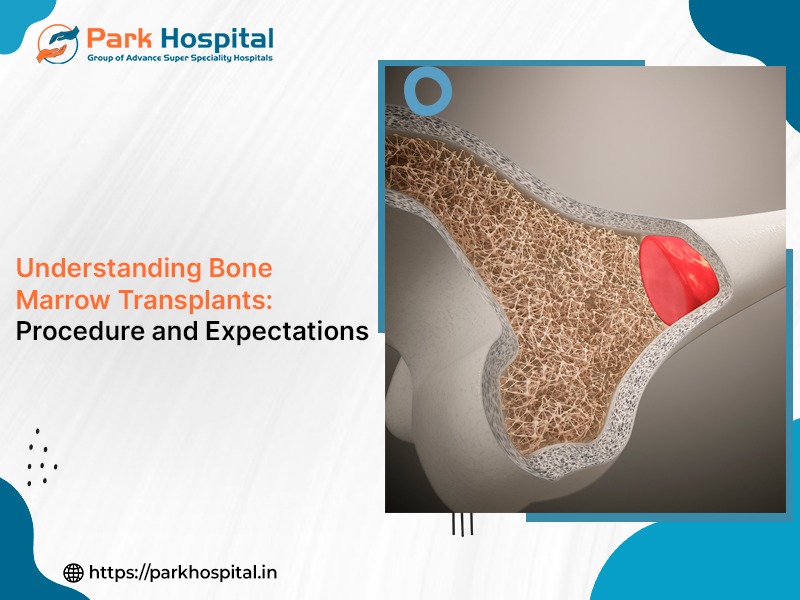Introduction
Bones are not present just to maintain the body's framework. They are much more vital than one might expect. Each bone of your body acts as a pillar, designed to support your weight, shield your organs and facilitate smooth movement. Nestled in the cavities of your bone resides the bone marrow. It is responsible for producing blood cells and platelets. If this vital functioning organ fails to work effectively, it can lead to severe conditions, deteriorating your overall health and well-being. Bone marrow failure is an excruciating condition where your bones stop producing enough blood cells that are required by your body to function efficiently. Understanding bone marrow failure, its causes, and its symptoms is extremely important in comprehending and acknowledging the hidden factories within our bones.
Park Hospital stands out as a leading healthcare facility, helping its patients navigate the struggles of bone marrow failure. With its cutting-edge technologies and a compassionate team of professionals, it never fails to foster an environment that calms the nerves of any overwhelmed patient.
Underlying Causes of Bone Marrow Failure
1. Inherited Conditions: Plenty of inherited conditions can lead to bone marrow failure. Diseases such as aplastic anaemia, Fanconi anaemia, and certain types of thalassemia come under this bracket. In cases of inherited bone marrow failure, it becomes extremely crucial to choose a bone marrow transplant as your treatment option.
2. Chemotherapy and Radiation Therapy: Chemotherapy and radiation therapy are one of the leading causes of bone marrow failure. These treatment methods focus on destroying rapidly dividing cells, which include not only cancer cells but also healthy cells in the bone marrow. This leads to the deteriorating health of bones, decreasing the production of blood cells.
3. Autoimmune Disorders: Autoimmune disorders are defined as self-contained conditions. It is a condition when the immune system mistakenly attacks the body’s own cells, leading to disrupting normal hematopoiesis (blood cell production). Conditions such as lupus erythematosus (SLE), rheumatoid arthritis, and aplastic anaemia are considered to be autoimmune disorders.
4. Nutritional Deficiencies: Several nutritional deficiencies can also lead to bone marrow failure. Lack of vitamin B12, folate, iron, and protein can significantly impact and influence the production of blood cells. In cases where these deficiencies begin to affect the health extensively, leading to significant bone marrow impairment, the patient might need to undergo a bone marrow transplant in order to restore health and function.
Signs and Symptoms Associated with Bone Marrow Failure
1. Anaemia: Anaemia is a condition caused due to a decreased amount of red blood cells in the human body, leading to reduced oxygen being transported to the body. This leads to rapid exertion, fatigue, and weakness. It also includes symptoms such as lightheadedness and an increased heart rate due to a very limited supply of oxygen to the body.
2. Easy Bruising and Bleeding: You may also notice that your body is getting easily bruised due to decreased production of platelets, also known as thrombocytopenia. You may also go through prolonged bleeding as your body will struggle to produce the right amount of platelets required for blood clotting. This is an alarming sign and requires you to consult a professional promptly.
3. Shortness of Breath: You may feel dyspnea and shortness of breath as a leading sign of bone marrow failure. An obvious reason behind it is the lack of oxygen being equally transported to the entire body. This will gradually make it difficult to perform daily activities, highly limiting your physical movements.
4. Increased Infections: A severe condition of bone marrow failure limits the production of white blood cells, which are essential to fight off any harmful bacteria, shielding your body from potential health risks. Since they are diminished, the chances of you getting infected become extremely high, putting you at a lot of risk.
Comprehensive Treatment Strategies for Bone Marrow Failure
1. Medications: Medication is the first step towards recovery. Surgeons of Bone marrow transplant in gurgaon often advise you to take tailored medications for the betterment of your overall health which may include antibiotics or antivirals, to prevent infections that are caused by a reduced amount of white blood cells.
2. Blood Transfusions: Blood transfusion is a medical treatment in which the patient receives red blood cells, white blood cells or platelets from a donor through an intravenous (IV) line. This proves to alleviate the severity of their condition as it gives their body a boost to work more efficiently.
3. Bone Marrow or Stem Cell Transplant: Bone marrow or stem cell transplant is a potentially curative treatment option for patients with severe bone marrow failure, particularly in cases where other treatments have been ineffective. This procedure involves replacing damaged or dysfunctional bone marrow with healthy stem cells, which can restore normal hematopoiesis.
4. Lifestyle Modifications: Several lifestyle modifications can be incorporated in order to achieve better health. Including iron, vitamin B12, folate, and protein in your diet is vital, along with whatever physical activity your body allows you to perform. The patient should prioritise their hygiene since they are more prone to getting infected. Smoking and drinking alcohol is prohibited as it will further compromise their weakened condition.
Understanding Bone Marrow Failure and the Commitment to Care with Park Hospital
Understanding bone marrow failure is essential for both early intervention and effective management. Park Hospital remains committed to providing comprehensive and compassionate care for patients facing this complex condition. With a multidisciplinary team of specialists and cutting-edge treatment options, including advanced bone marrow transplant in Gurgaon, Park Hospital is dedicated to delivering individualised treatment strategies tailored to each patient’s unique needs. This commitment to excellence ensures that those affected by bone marrow failure have access to the highest standards of care, empowering them toward recovery and improved well-being.









